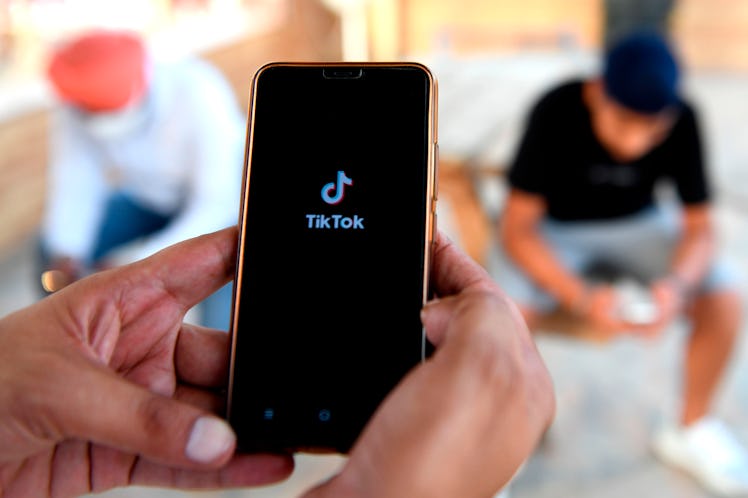
Here's What To Know About TikTok's Privacy & Data Policy
On Monday, July 6, Secretary of State Mike Pompeo told Fox News that the United States might ban TikTok and other Chinese social media apps due to national security concerns. Pompeo also made claims about what happens to TikTok users' information, including a suggestion that it winds up "in the hands of the Chinese Communist Party." Following his interview, you might be wondering what TikTok's privacy policy is and if you should be worried about what's happening to your personal data. Here's what to know about the company's current stance on privacy for its users.
During a July 6 interview on The Ingraham Angle with Fox News' Laura Ingraham, Pompeo said the U.S. government might ban Chinese social media apps, including TikTok, which is owned by the Beijing-based parent company ByteDance. "With respect to Chinese apps on people's cell phones, I can assure you the United States will get this one right too," Pompeo said. "I don't want to get out in front of the president, but it's something we're looking at." Legislators have long been concerned that Chinese-based social media companies could be pressured into sharing American user data with the Chinese government, and TikTok has been accused of censoring information and posts that Chinese authorities don't like. In response, TikTok tells Elite Daily in an emailed statement, "TikTok is led by an American CEO, with hundreds of employees and key leaders across safety, security, product, and public policy here in the U.S. We have no higher priority than promoting a safe and secure app experience for our users. We have never provided user data to the Chinese government, nor would we do so if asked." TikTok also published an Oct. 24, 2019 statement in response to concerns saying that all U.S. user data is stored in the United States, with backup in Singapore.
Pompeo didn't share a timeline of any proposed ban or if plans to bring about a ban are currently in the works. Elite Daily reached out to the State Department for additional comment on Pompeo's remarks as well as a timeline for a potential ban, but did not receive a response.
On Monday, July 6, TikTok announced it would no longer be available in Hong Kong in light of the passage of the area's National Security Law, which basically gives Beijing the power to crack down any pro-democracy protesters and critics of the Chinese government, according to the BBC. Pompeo's comments also come shortly after India announced it was banning Chinese social media apps that pose a "threat to sovereignty and integrity," according to a June 29 press release from India's Ministry of Electronic & IT.
Only time will tell whether the Trump administration decides to take a closer look at TikTok and other popular Chinese social media apps, but in the meantime here's what to know about how your data is actually used, according to TikTok's Privacy Policy.
How TikTok Uses & Stores Your Data
As of the Jan. 1, 2020, U.S. privacy policy, TikTok operates in much the same way as other social media platforms — by documenting user information to provide easy sign-ins and supply targeted ads, while also keeping track of your cookies and your search and browsing history on the app. In addition, the app has access to your location through your SIM card or IP address, as well as access to the messages you send on the app. If you allow it, the app can also access your phone contacts and social media contacts.
While the company may use your personal information as well as user-related activity on the platform for product testing, targeted advertising, and other customizable features, TikTok emphasizes that it does not sell personal information to third parties without your consent. One instance where a third party may be able to access your information include when the company uses it for business purposes, which TikTok describes in the policy as including "research, payment processing and transaction fulfillment, database maintenance, administering contests and special offers, technology services, deliveries, email deployment, advertising, analytics, measurement, data storage and hosting, disaster recovery, search engine optimization, marketing, and data processing."
Other ways a third party may see your data is when it's shared with a parent company, in the event of a merger or bankruptcy, and when the company responds to "subpoenas, court orders, legal process, law enforcement requests, legal claims, or government inquiries."
What This Means For TikTok Users
This means that you can expect TikTok to have access to any content you post, your comments and reactions on other peoples' TikToks, in addition to personal information like your name, your age, phone number, and email address, as well as payment information if you choose to add it.
The platform will also have access to your other social media accounts if you choose to link them, geolocation-related information from your IP address and phone’s location services, and your browsing and search history on the platform (including if you don’t have an account). Last but not least, the app collects and scans messages that you send, receive, and read through the platform
While it's hard to know how much information the company could hypothetically supply to its parent company ByteDance, you can request that the company delete all the personal information it's collected on you by emailing them at privacy@tiktok.com or mailing them at:
TikTok Inc.
Attn: TikTok Legal Department
10100 Venice Blvd, Suite 401,
Culver City, CA 90232, USA
In addition, TikTok outlines a few measures you can take for extra privacy, including managing your third-party advertising preferences and cookies and switching off your GPS location.
President Trump has yet to publicly comment on Pompeo's remarks, but in the meantime, you can check out TikTok's full privacy policy on its website.
This article was originally published on